Rani Mukerji, renowned for her stellar performances in Bollywood, recently shared her heart-wrenching journey of trying to conceive a second child and facing a miscarriage. In a candid interview with Galatta India, she revealed that she had been attempting to expand her family for seven years, desiring a sibling for her daughter, Adira, who is now eight years old. After numerous attempts, she finally conceived but tragically lost the baby. Rani described this experience as a trying time, emphasising that her age played a significant role in the miscarriage.
The actress expressed her deep sorrow over not being able to give Adira a sibling, stating, "It's not an age where I can have another baby. And it is traumatic for me that I can't give a sibling to my daughter. That really pains me." Despite her grief, Rani acknowledged the importance of gratitude, recognizing Adira as her miracle child and reminding herself to be grateful for what she has. She acknowledged the courage required to maintain contentment in such circumstances, stating, "So I'm working on it. I'm telling myself that yes, Adira is enough."

Understanding the Emotional Impact of Miscarriage
As per Dr Sangeeta Raodeo, Consultant Gynecology & Obstetrics, Fortis Hospital Mulund, miscarriage, or early pregnancy loss, is a devastating experience that can have profound emotional effects. Following a miscarriage, individuals may experience a range of emotions, including grief, hopelessness, sadness, guilt, anger, and jealousy. It is common for individuals to feel isolated in their grief, especially if they perceive that others in their social circle have not experienced similar losses.
While the emotional pain of miscarriage may be intense, it can be helpful to know that you are not alone. Miscarriage occurs in at least 10 per cent of pregnancies, highlighting the prevalence of this experience. Sharing your story with others who have experienced similar losses can provide comfort and support as you navigate your grief.
Coping with the Physical Aftermath
In addition to the emotional impact, miscarriage also involves physical changes and challenges. The extent of physical recovery varies depending on the stage of pregnancy at which the loss occurred. Some individuals may experience early miscarriages soon after realizing they are pregnant, while others may require medical intervention to complete the process of miscarriage.
Following a miscarriage, it is important to prioritize self-care and allow yourself time to grieve. Seeking support from friends, loved ones, and support groups can be beneficial as you navigate this challenging time. Additionally, speaking with a therapist or counsellor can help you process your emotions and cope with your loss.
Moving Forward: Long-Term Recovery
Long-term recovery from miscarriage is a personal journey that involves both physical and emotional healing. While your body will recover from the physical effects of miscarriage, the emotional impact may linger. It is important to give yourself time to grieve and seek support from others as needed.
As you navigate your grief, consider participating in support groups or seeking spiritual guidance if it aligns with your beliefs. Remember that there is no set timeline for recovery, and it is important to prioritize your emotional well-being as you move forward.
Bottomline
Miscarriage is a deeply personal and often traumatic experience that can leave individuals feeling overwhelmed and isolated. However, it is important to remember that you are not alone. Seeking support from others who have experienced similar losses can provide comfort and reassurance as you navigate your grief.
As Rani Mukherjee bravely shared her story, it serves as a reminder that healing is possible, and there is hope for the future. By allowing yourself to grieve, seeking support, and practising self-care, you can begin to heal from the pain of miscarriage and move forward with hope and resilience.